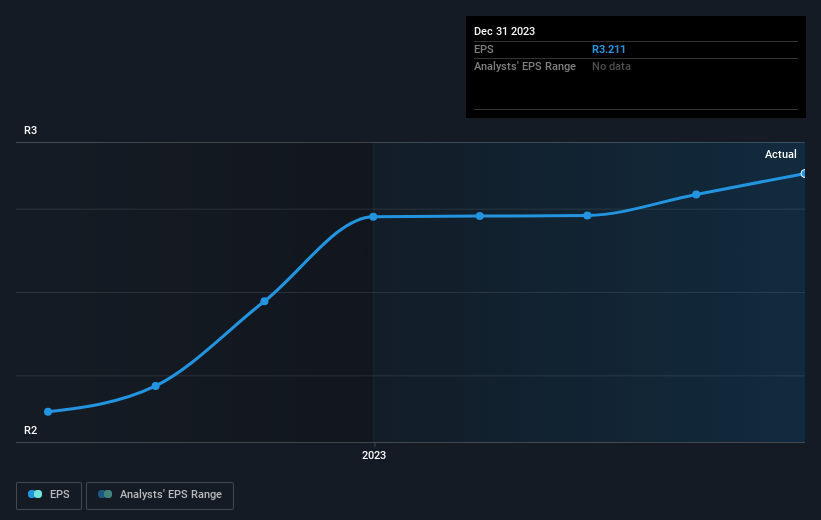- South Africa
- /
- Specialty Stores
- /
- JSE:HIL
HomeChoice International (JSE:HIL) jumps 14% this week, though earnings growth is still tracking behind one-year shareholder returns

The simplest way to invest in stocks is to buy exchange traded funds. But you can significantly boost your returns by picking above-average stocks. For example, the HomeChoice International plc (JSE:HIL) share price is up 44% in the last 1 year, clearly besting the market return of around 6.6% (not including dividends). So that should have shareholders smiling. Having said that, the longer term returns aren't so impressive, with stock gaining just 12% in three years.
Since the stock has added R365m to its market cap in the past week alone, let's see if underlying performance has been driving long-term returns.
See our latest analysis for HomeChoice International
There is no denying that markets are sometimes efficient, but prices do not always reflect underlying business performance. By comparing earnings per share (EPS) and share price changes over time, we can get a feel for how investor attitudes to a company have morphed over time.
During the last year HomeChoice International grew its earnings per share (EPS) by 8.8%. This EPS growth is significantly lower than the 44% increase in the share price. So it's fair to assume the market has a higher opinion of the business than it a year ago.
You can see how EPS has changed over time in the image below (click on the chart to see the exact values).

Dive deeper into HomeChoice International's key metrics by checking this interactive graph of HomeChoice International's earnings, revenue and cash flow.
What About Dividends?
When looking at investment returns, it is important to consider the difference between total shareholder return (TSR) and share price return. The TSR incorporates the value of any spin-offs or discounted capital raisings, along with any dividends, based on the assumption that the dividends are reinvested. So for companies that pay a generous dividend, the TSR is often a lot higher than the share price return. We note that for HomeChoice International the TSR over the last 1 year was 55%, which is better than the share price return mentioned above. The dividends paid by the company have thusly boosted the total shareholder return.
A Different Perspective
It's good to see that HomeChoice International has rewarded shareholders with a total shareholder return of 55% in the last twelve months. And that does include the dividend. Notably the five-year annualised TSR loss of 3% per year compares very unfavourably with the recent share price performance. The long term loss makes us cautious, but the short term TSR gain certainly hints at a brighter future. While it is well worth considering the different impacts that market conditions can have on the share price, there are other factors that are even more important. For example, we've discovered 3 warning signs for HomeChoice International (2 are concerning!) that you should be aware of before investing here.
But note: HomeChoice International may not be the best stock to buy. So take a peek at this free list of interesting companies with past earnings growth (and further growth forecast).
Please note, the market returns quoted in this article reflect the market weighted average returns of stocks that currently trade on South African exchanges.
Valuation is complex, but we're here to simplify it.
Discover if HomeChoice International might be undervalued or overvalued with our detailed analysis, featuring fair value estimates, potential risks, dividends, insider trades, and its financial condition.
Access Free AnalysisHave feedback on this article? Concerned about the content? Get in touch with us directly. Alternatively, email editorial-team (at) simplywallst.com.
This article by Simply Wall St is general in nature. We provide commentary based on historical data and analyst forecasts only using an unbiased methodology and our articles are not intended to be financial advice. It does not constitute a recommendation to buy or sell any stock, and does not take account of your objectives, or your financial situation. We aim to bring you long-term focused analysis driven by fundamental data. Note that our analysis may not factor in the latest price-sensitive company announcements or qualitative material. Simply Wall St has no position in any stocks mentioned.
About JSE:HIL
HomeChoice International
Operates as an omni-channel retailer in South Africa.
Proven track record slight.

